Sea: Exploring Earth's Oceans
The sea, also known as the ocean, covers more than 70% of the Earth's surface and plays a crucial role in the planet's ecosystem. It is a vast body of saltwater that is home to a diverse range of marine life and influences weather patterns, climate, and the overall health of the planet.
Key Concepts to Understand:
- Formation of Oceans: The oceans were formed over millions of years through processes such as volcanic activity, tectonic plate movements, and erosion.
- Ocean Zones: The ocean can be divided into several zones, including the sunlight zone, twilight zone, midnight zone, and abyssal zone, each with its own unique characteristics and inhabitants.
- Marine Life: The sea is home to a wide variety of organisms, including fish, mammals, invertebrates, and microorganisms, all of which have adapted to the unique conditions of the ocean environment.
- Ocean Currents: These are continuous, directed movements of seawater generated by forces such as temperature, salinity, wind, and the Earth's rotation. They have a significant impact on global climate patterns and marine life distribution.
- Importance of Oceans: The oceans play a crucial role in regulating the Earth's climate, providing a source of food and resources, and supporting countless ecosystems and livelihoods around the world.
- Human Impact: Human activities such as overfishing, pollution, and climate change have significantly impacted the health of the oceans, leading to concerns about the long-term sustainability of marine ecosystems.
Study Guide:
- Research Project: Choose a specific aspect of the ocean, such as a particular marine species, an oceanographic phenomenon, or an environmental issue affecting the oceans, and conduct in-depth research on the topic.
- Field Trip: Visit a local aquarium, marine research center, or coastal area to observe marine life, learn about ocean conservation efforts, and gain a firsthand understanding of the sea's importance.
- Interactive Maps and Tools: Use online resources to explore interactive maps of the world's oceans, track ocean currents, and visualize the distribution of marine species and ecosystems.
- Documentary Screening: Watch a documentary film about the oceans, such as those produced by renowned oceanographers and environmentalists, and discuss the key takeaways and insights gained.
- Simulation Activities: Engage in hands-on simulations or virtual experiments to demonstrate oceanographic concepts, such as the formation of ocean currents, the effects of ocean acidification, or the behavior of marine organisms.
- Debate or Discussion: Organize a debate or discussion on contemporary issues related to the oceans, such as the pros and cons of marine protected areas, the impact of plastic pollution, or the potential benefits of sustainable fishing practices.
By exploring the complex and dynamic world of the sea, students can develop a deeper appreciation for the oceans and their vital role in sustaining life on Earth.
.◂Science Worksheets and Study Guides Sixth Grade. Mollusks, Arthropods and Echinoderms
Study Guide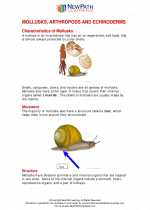 Mollusks, Arthropods and Echinoderms
Mollusks, Arthropods and Echinoderms  Activity Lesson
Activity Lesson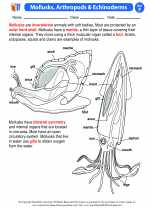 Mollusks, Arthropods & Echinoderms
Mollusks, Arthropods & Echinoderms  Worksheet/Answer key
Worksheet/Answer key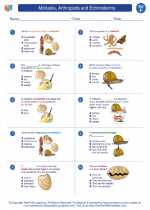 Mollusks, Arthropods and Echinoderms
Mollusks, Arthropods and Echinoderms  Worksheet/Answer key
Worksheet/Answer key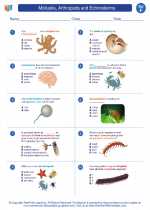 Mollusks, Arthropods and Echinoderms
Mollusks, Arthropods and Echinoderms  Worksheet/Answer key
Worksheet/Answer key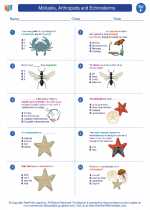 Mollusks, Arthropods and Echinoderms
Mollusks, Arthropods and Echinoderms  Worksheet/Answer key
Worksheet/Answer key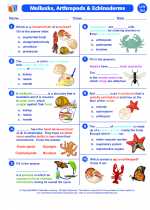 Mollusks, Arthropods and Echinoderms
Mollusks, Arthropods and Echinoderms  Vocabulary/Answer key
Vocabulary/Answer key Mollusks, Arthropods and Echinoderms
Mollusks, Arthropods and Echinoderms  Vocabulary/Answer key
Vocabulary/Answer key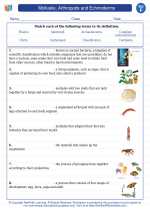 Mollusks, Arthropods and Echinoderms
Mollusks, Arthropods and Echinoderms  Vocabulary/Answer key
Vocabulary/Answer key Mollusks, Arthropods and Echinoderms
Mollusks, Arthropods and Echinoderms  Vocabulary/Answer key
Vocabulary/Answer key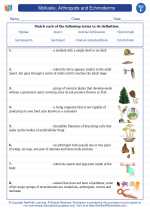 Mollusks, Arthropods and Echinoderms
Mollusks, Arthropods and Echinoderms  Vocabulary/Answer key
Vocabulary/Answer key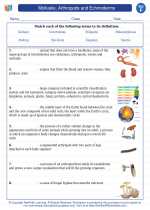 Mollusks, Arthropods and Echinoderms
Mollusks, Arthropods and Echinoderms  Vocabulary/Answer key
Vocabulary/Answer key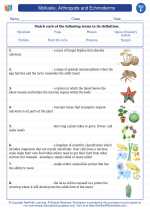 Mollusks, Arthropods and Echinoderms
Mollusks, Arthropods and Echinoderms  Vocabulary/Answer key
Vocabulary/Answer key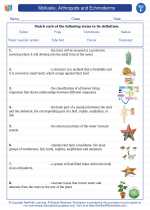 Mollusks, Arthropods and Echinoderms
Mollusks, Arthropods and Echinoderms 

 Activity Lesson
Activity Lesson
 Worksheet/Answer key
Worksheet/Answer key
 Worksheet/Answer key
Worksheet/Answer key
 Worksheet/Answer key
Worksheet/Answer key
 Worksheet/Answer key
Worksheet/Answer key
 Vocabulary/Answer key
Vocabulary/Answer key
 Vocabulary/Answer key
Vocabulary/Answer key
 Vocabulary/Answer key
Vocabulary/Answer key
 Vocabulary/Answer key
Vocabulary/Answer key
 Vocabulary/Answer key
Vocabulary/Answer key
 Vocabulary/Answer key
Vocabulary/Answer key
 Vocabulary/Answer key
Vocabulary/Answer key

The resources above cover the following skills:
LIFE SCIENCE
From Molecules to Organisms: Structures and Processes